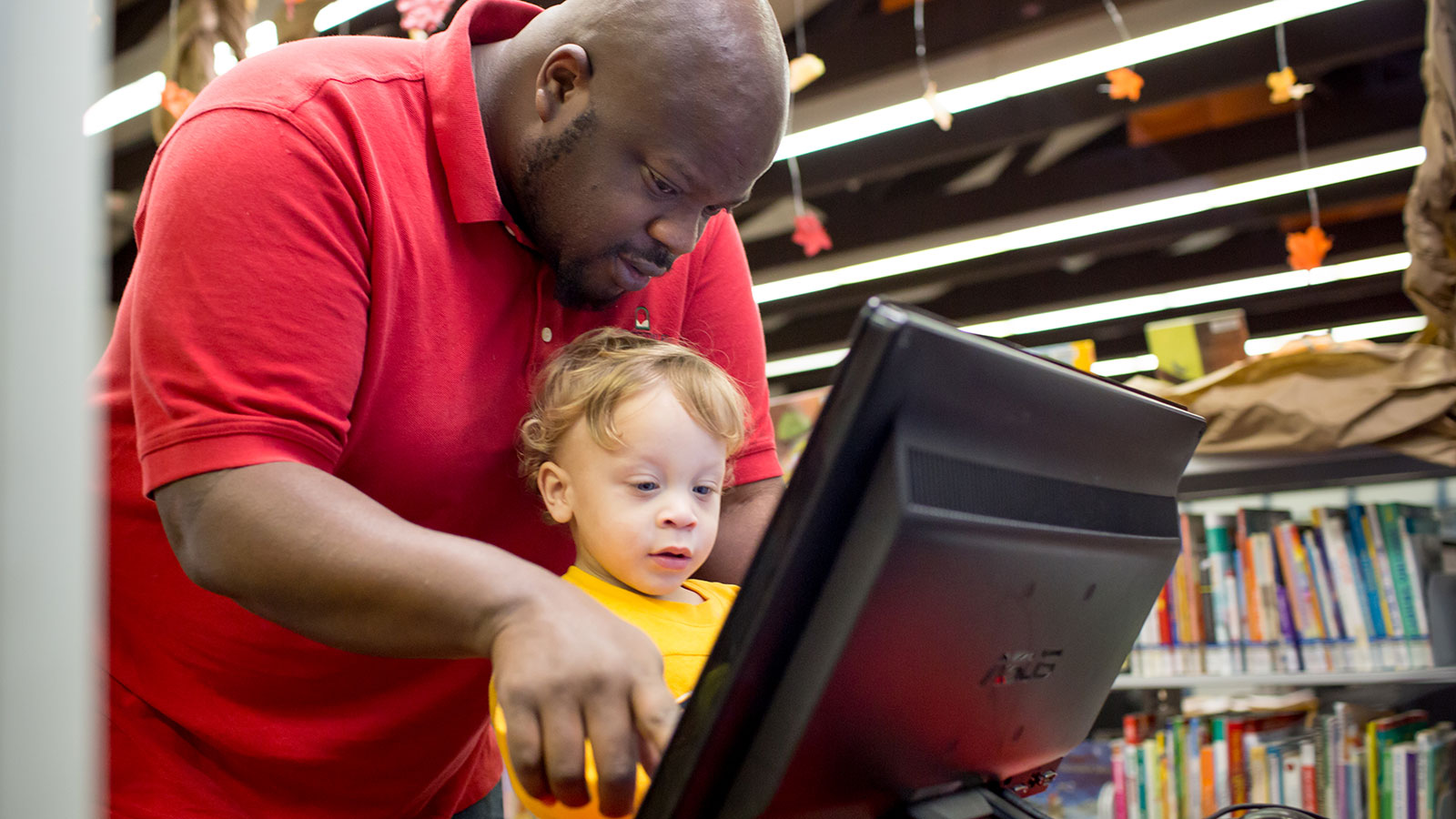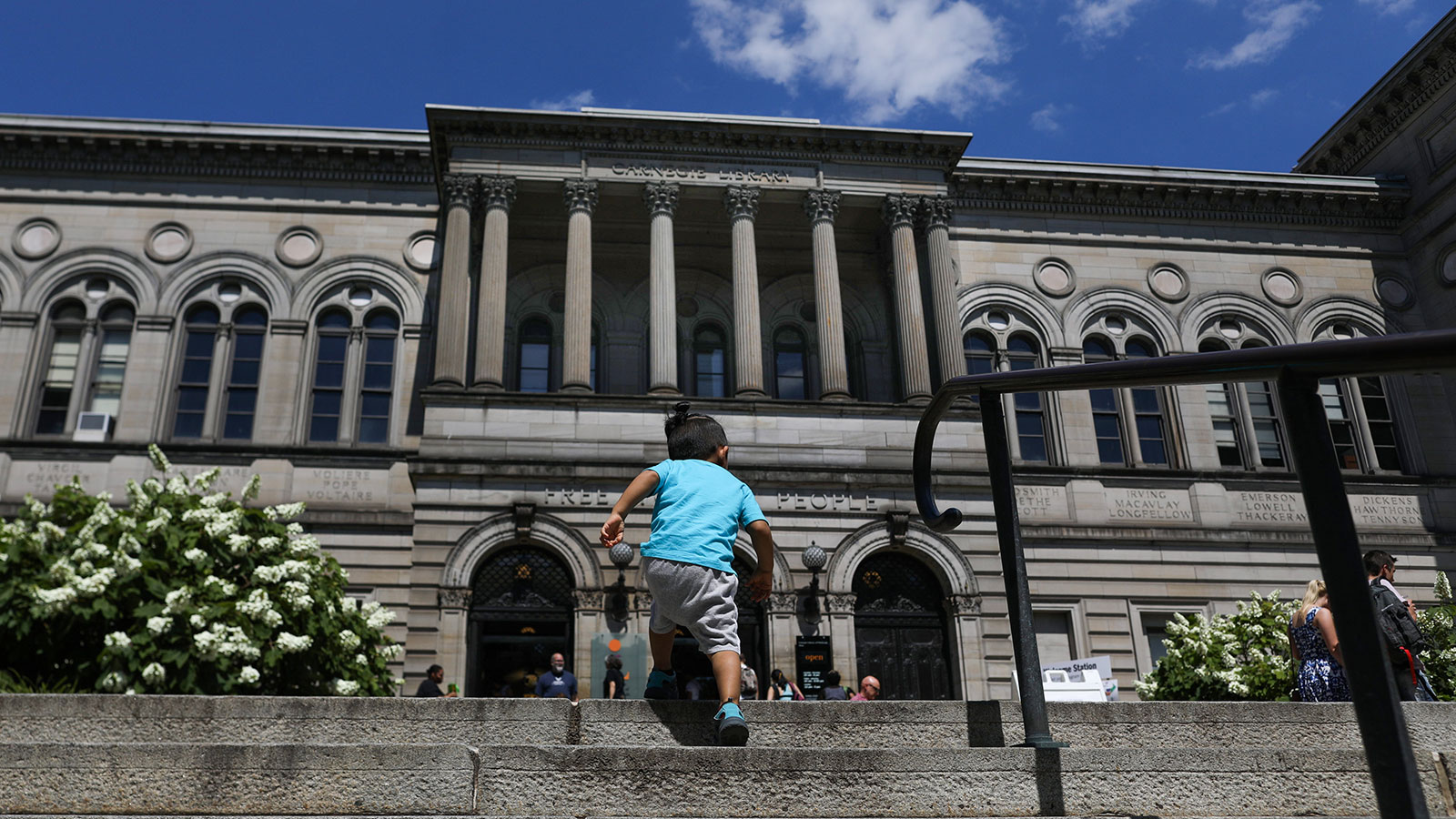Carnegie Library of Pittsburgh
Mary Frances Cooper
President and Director
Letters to Andrew Carnegie | Carnegie Library of Pittsburgh
Dear Mr. Carnegie,
I wish that it were possible to walk with you through the rooms, the stacks, and the spaces of Carnegie Library of Pittsburgh’s Main Library. I can imagine an enlightening conversation in which you share your original vision for the design and I tell you what has changed since you founded this library in 1895. Together we could marvel at the ways in which the building has evolved to accommodate the collections and services we offer today. It would be such an honor to be able to see our library through your eyes.
I know that you would expect our collection of books to have grown significantly since your time. They fill the stacks and spill into spaces that were originally intended for other purposes. We collect and curate wisely, and have done so since the day you opened our library. Our collection reflects both what is current and what is most important to keep from the past for the people of today and for those in the future.
You would likely be amazed but not surprised by the technology that is available to us and the ways in which the Library uses that technology both to manage our work and to connect people with content and resources from all over the world. As it was from the very beginning of Carnegie Library of Pittsburgh, we know that the people of our community need to master new tools and acquire new knowledge in order to meet their goals. Through the years, we have made products and devices available that speed access to information and foster skills proficiency for work, educational, and life success.
I would want to take you out to Pittsburgh neighborhoods to visit our branch libraries. You will find that some of the libraries that you built still stand as vibrant, welcoming anchors in their communities. A few of the original buildings are no longer functioning as libraries or may be gone altogether. In every case, newer buildings serve those communities. Over the years, we have established libraries in neighborhoods beyond those you had originally identified. We now have nineteen locations within the City of Pittsburgh. Nearly all have been renovated, updated, or replaced in the last twenty years.
When we visit, you will still see people reading quietly and children sitting still to listen to a story. You are just as likely to see people working collaboratively on projects, discussing their work, using computers, white boards, and cameras to create or illustrate their ideas. You will hear children singing and laughing, and you can watch them in creative play. You will find spaces reserved just for teenagers, that special stage in life where friendship, aspirations, and an emerging sense of self all come together to shape a promising future. Please be advised that our teen spaces are crowded and noisy, but in a good way. That is how teens learn and grow.

Mr. Carnegie, we must address the best and most important aspect of our Library, and that is the people. By that, I mean the Library staff, the residents of Pittsburgh and Allegheny County whom we serve, and our volunteers, funders, donors, and community partners who support our work. At Carnegie Library of Pittsburgh, we often say the library is something we all do together. It truly takes the collective efforts of our entire community to ensure our viability and our success. This, Mr. Carnegie, was your original vision as it was reflected in the trust agreement that you established with the City of Pittsburgh so long ago — a document that still serves as the bylaws and operating principles for our Board of Trustees to this day.
In the past few years, we have been fortunate to host naturalization ceremonies at our library. There really is something very fitting in becoming a citizen of our democracy at the public library. I am honored and privileged to address these new citizens each time.
I want to make particular mention of the Library staff. They are as wonderful a group of people as you could ever know, and I would posit that they have always been so throughout the decades of our existence. People who work at the public library have passion — for learning, literacy, literature, and for other people. Early on in the history of the library, an effort was made to hire people who were learned, scholarly, and erudite; who were well versed in history, the arts, literature, and the sciences. Today we still hire for education but we look more for kindness, curiosity, and compassion. We want people who can be interested in whatever someone else is interested in, and who will pursue that interest with a passion until the customer is satisfied.
The public library today is a much more complex organization than it was in 1895. In addition to those who manage and maintain collections and engage people of all ages in literacy and learning, we need staff members who secure our funding, administer our finances, promote our services, oversee our facilities, guide staff support, manage our information technology, and more. You know, Mr. Carnegie, that the library is funded primarily with public dollars. You said yourself that, “unless a community is willing to maintain Public Libraries at the public cost … very little good can be obtained from them.” No one will get rich working here. Although we do our best to provide good salaries and benefits, we know people who work at the Library are motivated by much more than financial gain. We sincerely believe in the mission. We are proud of the words “Free to the People” that are chiseled over our doors.
You would be so gratified to know how important the public library is to so many people. Every day we hear memories and stories that are heartwarming and humbling. People speak fondly of childhood trips to the library with a parent, a sibling, or a friend. They tell us the library was the first place they came when they were new in town and how they found a community here. They share that they borrowed a book that helped them understand they were not alone; others think or feel the same way they do. They say that when they were at the lowest point in their lives, visiting the public library helped them through their troubles. They let us know that with our assistance they got the job, passed the test, won an award, or achieved a goal. At the library they feel they can always be their authentic selves, and that matters. As librarians, we take everyone as they come, and we try to help in the best way that we can.

Mr. Carnegie, I want you to know that you have truly left a legacy that endures. Your work and your story still make a difference. We cite your words and recognize your influence regularly. As an example, in the past few years, we have been fortunate to host naturalization ceremonies at our library. There really is something very fitting in becoming a citizen of our democracy at the public library. I am honored and privileged to address these new citizens each time.
I always tell them about you, Mr. Carnegie, our founder. I tell them you were also an immigrant. I say that you came to this country with your family as a boy from Scotland and settled in Allegheny City, which we now call the North Side. I share that you did not go to school; you had to go right to work to help support your family. I mention a gentleman in town named Colonel James Anderson who had a roomful of books, a veritable library, in his house, and how on Saturdays he would invite the working boys in to select a book to borrow and read for the week. I tell them that you, young Mr. Carnegie, took full advantage of this opportunity, and you credited this reading for your success as you went on to become one of the richest people in the world. When you decided to give back, you built public libraries in our city, region, country, and beyond. You were steadfast in your belief that with access to books and reading and self-directed learning, a person could be anything he or she might want to be. This belief is still core to library services today.
I urge our new citizens to take full advantage of all the organizations and institutions that exist in our country to serve them, including their public library. Of course, they are nervous and excited at this important moment, and may not quite hear it, but each time several people nod and smile when I talk about the library. Sometimes someone will pull out his or her library card to show me, and it grabs my heart.
Mr. Carnegie, I believe that your true legacy is how your particular brand of philanthropy reflects a fundamental faith in people and in our individual and collective desire to do the right thing. Through the institutions and causes you chose to fund, we see evidence of your belief that, given the right support, people will work hard, study, and learn; become better versions of themselves; value science, arts, and culture; aspire to world peace; and risk, even sacrifice, their own lives to save others. People of great wealth today have embraced your conviction that their riches should be put toward health, education, and other causes that benefit humanity. The public libraries you founded are still going strong, ever firm in our belief that access to books and reading and self-directed learning can change lives.
Very sincerely yours,
Mary Frances Cooper
President and Director
Carnegie Museums of Pittsburgh
Carnegie Trust for the Universities of Scotland
Carnegie Institution for Science
Carnegie Foundation | Peace Palace
Carnegie Dunfermline Trust | Carnegie Hero Fund Trust
Carnegie Rescuers Foundation (Switzerland)
Fondazione Carnegie per gli Atti di Eroismo
Stichting Carnegie Heldenfonds
Carnegie Foundation for the Advancement of Teaching
Carnegie Endowment for International Peace
Carnegie Corporation of New York
Carnegie Council for Ethics in International Affairs

